Sunday, August 7

|
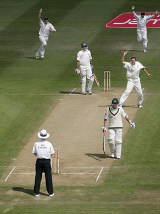
One of the greatest finishes to one of the greatest Tests
© Getty Images
|
|
Did it happen? Was I really there? Already the Edgbaston Test feels slightly unreal, even ridiculous. A game with more than 700 runs in boundaries won and lost by two runs? Test cricket has no business with results so close. Tight finishes are meant to be the prerogative of one-day and Twenty20 cricket. It's in the nature of Test matches that they multiply possibilities and magnify differences. But not, gloriously, today.
When I was growing up, I often wondered what it would have been like to attend one of the great matches of the past: the original Ashes Test at the Oval, perhaps, or Tate's match. Then one day I twigged that it would have been no fun at all. If one knew the
outcome, the whole point of sport's unscripted drama would be lost. I steadily came to the same conclusion about one-day cricket. I can recall the first tie I saw between first-class teams: a high-scoring county encounter at Colchester. I recall the occasion especially because, to my surprise, there was no tension about it whatsoever. The whole affair was so obviously contrived to achieve a last over thrill that it seemed fake, a put-up job, sideshow trickery. There was nothing fake today, even though an uneasy crowd, with a classically English belief in Sod's Law, seemed to sense from the beginning that England would
need all 106 of its reserve runs. Not until Australia was thirty runs from victory did the Barmy Army really get stuck in, and even then there seemed a catch in the throat of its chorus.
The game reminded me of the Adelaide Test just over a decade ago, when Ian Healy and Damien Fleming guided Australia to within an ace of saving a game they had no right to - with one crucial difference. I was at that Adelaide game too, and one held onto great Ashes memories in those days: they were few and far between. Times are changing: after less than seven days' cricket, this series has already contained more drama than any of the last fifteen years.
To the foregoing, there must be one qualification: the recollection of how different a place the world looked at 12.09pm. Frankly, putting partisan considerations to one side, England had to win today for the sake of the narrative of this series. Had Australia burgled a victory, as looked very probable at that point, the sense of deflation would have been almost unbearable; we hacks, too, might as well have gone home and surrendered the sports pages to football. As Australia closed remorselessly on the target, the
colleague next to me, a most able and conscientious young journalist, confided earnestly: `This is the worst day of my career. I am going to ring the office and tell them I can't write anything.' Ricky Ponting was right when in the press conference he repeated the truism that it is called Test cricket for a reason: it is a test for journalists too. Like no other match I've attended, in fact, this one has left me feeling both privileged and proud: privileged to have been part of it, and proud of the game I love. Did it happen? Was I there? It did, and I was.
Saturday, August 6

|
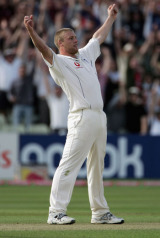
Andrew Flintoff: a workman in love with his job
© Getty Images
|
|
At the start of this tour, Ricky Ponting was invited to speculate on whether any English player might at a pinch feature in a putative Australian starting XI. The only candidate over which he paused was Andrew Flintoff, and then he thought better of it. A Pommie among Aussies? He might forget to put the beer in the fridge.
What response would the same question now elicit? Twice Australia held the upper hand today; twice, with bat then ball, Flintoff prised it off. With the innings dwindling round him, he masterminded an orderly retreat that turned into a thrilling counterattack, scoring 73 of the last 109 English runs from 86 deliveries. In the first innings, the only sign that he was reading Warne were his eyes spinning counterclockwise; now, he played Warne like a gnarled county pro, mostly with the pad, while he laid about him in every other direction.
Flintoff then started the second innings on a carryover hat-trick, having upended Gillespie and Kasprowicz to finish the first innings. He achieved everything but, bowling Langer off an inside edge with the second delivery of his first over, then brushing Ponting's outside edge with the last, going from round the wicket to a left-hander to over the wicket to a right-hander without a flicker of the dial. More than that, the Australians were buffeted by the wave of aggression that preceded him up the wicket. He was following through almost three-quarters of the length of the pitch, and it was no affectation. He was marching back to his mark like a workman in love with his job, accompanied by the Barmy Army bugler's rendition of the Flintstones theme.
Once prised open, the Australian innings was undermined further by carelessness. Hayden, who drove at a wide one and Martyn, who flicked in the air, left with their heads penitentially bowed. And watchers had no sooner grown used to the subversive idea of Giles turning the ball than he produced a straight one to Katich.
Even then, Flintoff just kept on giving. He sent the Barmy Army and its whole ersatz auxiliary corps into noisy raptures when picked out by Gilchrist at mid-on, and pinned Gillespie with the yorker that sufficed in the first innings at Lord's and here. When Harmison bowled Clarke with an outrageous slower ball that barely reached the other end, it was the end of one of the most extraordinary days of cricket I can remember. Such hopes as the visitors keep alive now rest on Warne - which does not have quite the same reassuring ring as it had only a week or two ago.
This was cricket in the best Ashes traditions, even if there seemed little traditional about it. On arriving at the ground this morning, I had to wait for my security check while men wearing a koala suit and a pink panther suit were screened by a metal detector: no racial profiling here, Guardian readers will be pleased to know. On the other hand, the day was begun by leg-spin of the most classical and beguiling kind with a ball only six overs old.
Shane Warne finished the day with consecutive swept sixes from Giles, which he will have enjoyed. More enjoyment impends, for he also finished with 599 Test wickets after making headway on his second hundred wickets in England.
The first century, which accrued when he dismissed Strauss with Friday's preposterous finale, is a feat without precedent; that an Australian leg-spinner would accomplish such a milestone would have seemed inconceivable as little as fifteen years ago.
Of the leg-break bowlers who have come to England from the Antipodes more than once this century, only Warwick Armstrong improved on his overall Test record: his 40 wickets here cost 29.15 versus an all-time, all-venue 33.59.
O'Reilly's 50 wickets cost 26.16 (compared to his career bowling average of 22.59), Grimmett's 67 wickets 29.95 (24.21), Mailey's 26 wickets 38.07 (33.91) and Benaud's 25 wickets 39.68 (27.03). Benaud is recalled, of course, for his 1961 Old Trafford coup - excluded from his performances, however, the great man's wickets here came at a pricey 48.5 runs each.
Warne, of course, is alieni generis. Five of Warne's six for 46 were taken from round the wicket - and if a leg-spinner has executed a greater proportion of his victims from round the wicket, I do not know of him. Warne receives too little credit for this. Before him, the leg-spinner only bowled round the wicket as a negative ploy; Warne has reinvented the angle as an attacking option. His tutor in this was Bob Simpson, who many years ago bowled in this vein to Warne in the nets to illustrate its perplexities.
The style and the variety he has achieved in it, however, are Warne's own.
'He seemed to attack from all directions,' wrote Bradman of O'Reilly; the description might be thought even more apposite for Warne.
This was exquisitely illustrated by the dismissal of Bell, after an innings of encouraging composure. Bell was batting on leg to guard his stumps from the ball by which Warne likes to circumnavigate his opponents; in response, Warne delivered a shot across Bell's bows whose deviation the tyro could not quite cover. It was reminiscent of the means by which Warne deceived a far more experienced batsman, Michael Atherton, at Trent Bridge four years ago.
He might sometimes forget he is married, but Warne never forgets a wicket.
Lee, meanwhile, proved his likeness to the girl with the curl in the middle of her forehead. His opening spell of 7-1-19-3 was made possible by some inadequate footwork and poor judgement from Trescothick, Vaughan and Hoggard, but he was hitting Gilchrist's gloves with a whack that not even the Barmy Army could drown. His best delivery was a lifter that followed Geraint Jones as pitlilessly as a bailiff on a bankrupt's trail.
When Simon Jones joined Flintoff, however, Lee could somehow not summon the yorker that he usually produces on demand in one-day cricket. Flintoff found the room to execute an effortless short-armed heave into the Hollies Stand; Lee did not even watch the ball, simply turning on his heel, chastened. He then had an extensive brood when Billy Bowden, quite rightly, denied him an lbw against Jones, followed by a kick at the end of the over like a petulant child demolishing their castle when told to come in from the sandpit.
Australia were fortunate, in fact, that England did not do more to stretch their bowling resources. Gillespie did nothing in his eight overs to suggest that his tour was turning the corner, his innate lugubriousness deepening with every delivery. His Test might have been different had Warne, standing a little deep at slip, held Strauss on the first morning. But he did himself no favours yesterday, fluffing a simple return catch from a miscue offered by Geraint Jones for which the only explanation was that his cricket life flashed before his eyes - as well it might be at the
moment. A wicket would have reduced England to 7-84 and Australia's target
might have been crucially reduced.
Kasprowicz's three overs certainly hit the bat hard, but only as they were leaving it en route to the Ryder Stand straight behind him. The last involved nine deliveries and yielded 20 runs, as Flintoff struck poses for which only Botham could have been the model. Botham? You remember him don't you? C'mon: he was The Old Flintoff.
Friday, August 5

|
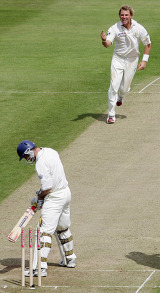
Shane Warne: got Andrew Strauss with a wonder-ball
© Getty Images
|
|
In the last hour of today's play, the ground announcer was heard to request the attention of a `Mr Ivan Milat'. Ah, those jolly Aussie japesters. Milat, for those who don't know, is serving a very long prison stretch down under for entertaining backpackers the way Fred and Rosemary West used to entertain their houseguests; at least it made a change from another appearance by the well-travelled yet somehow evergreen Mr Hugh Jarse.
Visitors, though, needed something to amuse themselves today. England's 99-run first-innings lead - the first it has wrested from Australia since the corresponding Test here eight years ago - is of proportions close to decisive. England's thrust was so convincing that it could afford to donate Australia a generous 31 freebies, made up of 12 byes conceded by the hapless Geraint Jones, two helpings of four overthrows, ten no-balls and a wide. Shane Warne bowled Strauss with a wicked ball that spun at right angles to close the day, but there are no left-handers to follow Trescothick who will find the rough as challenging; Australia, meanwhile, packs four southpaws in its top seven, and must bat last.
Another key advantage that England revealed this afternoon was the reverse swing capabilities of Jones and Flintoff, who jagged the ball in the air after tea when the slow surface was offering the faster bowlers nothing. Gillespie, Lee and Kasprowicz achieved
nothing remotely similar; batsmen, if anything, welcomed their pace onto the bat. England have the winning of this Test, and if they don't know it now they never will. Australia, cricket's resident serial killer, is theirs for the capturing.
Thursday, August 4
`The Man Who Wasn't There' is the Hitchcockean title of a mediocre Coen brothers film in which Billy Bob Thornton tilts at the world celluloid cigarette smoking record as a sign of his brooding intensity. The title fitted far better today's events at Birmingham, when the absence of Glenn McGrath proved as influential as his presence at Lord's. I've chosen for tomorrow's Guardian to write about the effect of his absence, which entailed the small matter of 276 runs in boundaries; it may be worth wondering here about the cause.
The injury itself was solace to the Fred Trueman school of `in my day we got fit by bowling, once we'd finished working our 16-hour shift down the pit'. And they may even have had a point. Ask Dean Jones. Twenty years ago, Jones missed a tour of England after a mishap in an impromptu game of Aussie rules involving Merv Hughes: it's arguable, of course, that anyone game enough to play Aussie rules with Merv had it coming to them. In more recent times, Adam Gilchrist was lamed in a fielding soccer routine at Manchester in July 1997 when Ponting landed on his knee, while Alex Tudor fell victim to an impromptu round ball game before the Boxing Day Test of 1998. And last November, Sven, the Yarras' fast bowler, or perhaps that should be fastest bowler, strained his dicky calf playing touch rugby. You may think that unimportant, but it mattered to us. Soon after, I also strained a hamstring running off the field when it started to rain, which is less relevant, but which my teammates found very funny at the time.
The argument for cross-training of the kind in which the Australians were indulging yesterday is usually to relieve the monotony of concentration on cricket skills. In fact, McGrath trained lightly if at all on Wednesday, and he now won't be doing much for another
few weeks. He had surgery on both ankles last year. Was it wise to be larking about so on the morning of a Test? Perhaps the question is not merely of where McGrath wasn't, but of where he shouldn't have been.
Wednesday, August 3

|
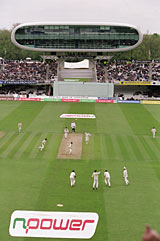
Johnny Borrell of Razorlight is a fan of the Lord's media centre
© Getty Images
|
|
Never mind Michael Vaughan's elbow or Ashley Giles' psyche. On the eve of
the Second Test, English cricket has had a timely boost from the game's
appearance on the cover of the hipster's bible, Time Out. The cover
promotes an interview with Johnny Borrell of Razorlight, who poses next to
the image of some stumps stencilled on a brick wall, and what we're
excitedly informed is the vocalist's own bat - which, bare of stickers a la
Steve Waugh at the Oval four years ago, suggests Borrell may be seeking a
sponsor. The interview took place in the Lord's Media Centre, about which
Borrell is a wild enthusiast. "This is the coolest fucking place," he says,
having never shared one phone connection with another five correspondents.
Borrell, nonetheless, seems a genuine devotee: "It seems that people want to
mess around with sport more and more. But football is a magic sport,
cricket is a magical sport, leave them alone." He gives an impressively
articulate explanation of his fandom, how it helped eat up time when he was
on the dole: "If you have back-to-back Tests," he comments, "that's ten days
out of two weeks". Not at the moment it's not. Come on England! You're
letting down an unemployed generation! Perhaps the most interesting remark
he makes - it is even slightly chilling - concerns television: "It does
worry me that this is the last Test series on terrestrial TV. If cricket
had been on Sky when I was 17, I would never have got into it." You're
worried Johnny? That's you and me both.
In general, this is the most positive press I have read about cricket in
England this summer: cricket was probably last on the cover of Time Out in
when W. G. gave an interview professing an admiration for Gilbert and
Sullivan. The magazine has leveraged off the interview to provide a guide to
cricket in the capital, although to bulk up its statutory irony quotient
also burdens us with another example of the popular sub-genre of
"woman-who-does-not-understand-cricket-tells-us-that-she-does-not-understand-cricket".
Does anyone write this sort of junk about any other sport, pastime or
pursuit? Would you run something headlined "I Thought They Were Gay But It
Turned Out to Be Ballet" or "10 Reasons Wallpaper Beats Art"?
There is, mind you, a slightly troubling undertone in cricket's turning up
on the radar of London cool, that cricket is now seen as so quaint and
anachronistic that when the lead singer of Razorlight professes to enjoy the
game, it is as though he has expressed an enthusiasm for contract bridge or
underwater bocce. This may, though, simply reflect the attitude in the game
itself, given that the ECB has deliberately narrowed its audience by taking
the Sky shilling, milking what they have rather than building on it. So,
one good turn deserves another, Johnny: I promise to buy the next Razorlight
album.
Tuesday, August 2

|
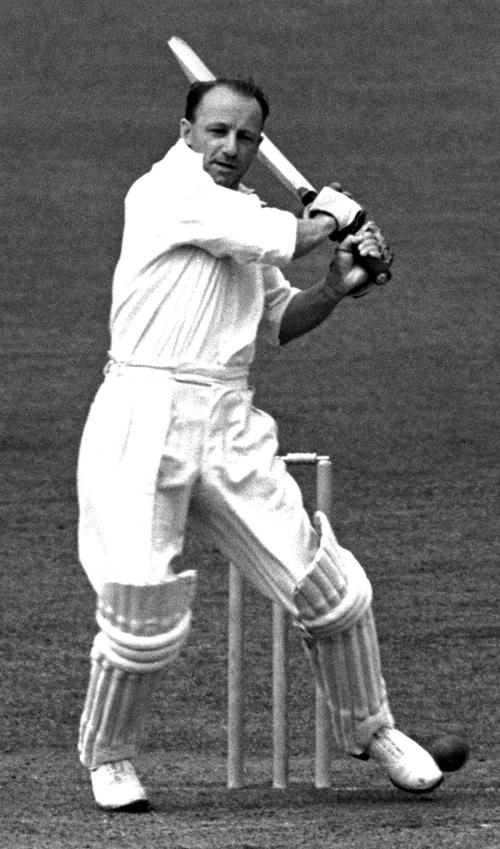
The days of competitive tour matches are long gone
© Getty Images
|
|
The Australians' game with Worcestershire ended in a draw yesterday. As a sports news item, this is something to rival Claude Cockburn's famous candidate in the competition among Times sub-editors for the year's dullest headline: "Small Earthquake in
Chile: Not Many Dead." The days are long gone when Australia's journey to New Road marked the beginning of their tour, when Bradman famously hit a century or double-century in the shadow of Worcester Cathedral on four consecutive occasions, beginning with his 236 in his inaugural innings on English soil in 1930.
This is usually how traditionalists begin a "Why O Why" piece about the decline of the tour match, reminiscing of the days in which the whole of the county turned out to see their heroes challenge the might of Australia, and explaining how the Aussies' game against Yorkshire used to be regarded as a "Sixth Test". It's a melancholy decline, I grant you, but the blame lies squarely with the counties, states and provinces who brought such fixtures into disrepute by resting key players from them. As Steve Waugh complained to me five years ago: "The last couple of [Ashes] tours, the county games were a waste of time anyway. You were playing teams half-full of 2nd XI players, you went through your paces and won quite easily, and that to me doesn't make a good tour. You want quality games." The time is coming when there may be no first-class fixtures outside the Tests at all.
Monday, August 1

|
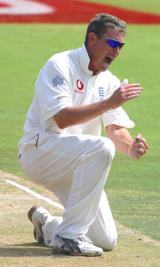
Ashley Giles: the new Andy Caddick?
© Cricinfo Ltd
|
|
Andy Caddick has been missed in this Ashes series - not as a bowler, but as a writer. The tissues of self-justification he composed for his newspaper employer in 2001 were unmissable: it was always just his luck that the ball stopped swinging the moment England came onto bowl, and as a result the Aussies kept on making these totally arsey hundreds.
Caddick may, however, have a successor. Ashley Giles has sailed into print in the Guardian with a column baiting his baiters, complaining about "hurtful" and "unfair" critics of his bowling in the First Test. "I am angry and I think have a right to be," he says. "I feel like I am pissing into the wind." Giles is unmoved by the help this may give his loop: "People will accuse me of being sensitive and maybe I am. Maybe I should stop reading the papers. But I'm worried that people might drag me down. It feels like a bit of a witch-hunt. I try to keep the blinkers on and keep the critics at bay, but there are only so many times that you can fend them off. I suspect that people are after me again." He also shares an exclusive with us: he is not Shane Warne. His wife will be pleased, at any rate.
Not only because he is a Guardian colleague am I loath to write ill of Giles. He is an improving cricketer important to England's excellent record over the last 18 months, by all accounts an excellent team man, and generally pretty stoical. No one becomes a bad player overnight, and it cannot be other than upsetting to be written off so peremptorily. If he gets wickets against the Australians, I will be surprised. They manhandled a superior left-arm tweaker in Daniel Vettori a few months ago, and I can't see finger spin of any ilk troubling the tourists for the next seven weeks. But there simply aren't many options in England. There is, of course, no wrist-spin on offer - unless the Ian Salisbury self-service queue is reopened.
Giles's despatch, however, is ill-advised. With a Test at Edgbaston round the corner, he might gainfully study the coverage of the corresponding game there thirty years ago, when the press erected an auto-da-fé in honour of captain Mike Denness after he inserted Australia and lost by an innings and 85 runs. Denness had been given a horrid time in Australia. He once received a letter addressed simply to "Mike Denness, Cricketer", which read simply: "If this reaches you, the Post Office think more of you than I do." But at Birmingham, the local press were able to roast him over their own coals; by the time he was finished, Denness had been thoroughly charred. Even his successor Tony Greig was horrified, and swore as a result that he would always jump before he could be pushed.
The recent release of Keith Fletcher's memoir reminded me, likewise, of the day ten years ago in Australia when a tabloid newspaper published the fax number of England's team hotel in Sydney and encouraged readers to register their disgust at its performances. Hotel staff obligingly filled an envelope with anatomically explicit advice and some helpful illustrations, then pushed it under Fletch's hotel room door; his wife opened it.
By these standards, the attention Giles has attracted has been the soul of kindness. Frankly, he has taken three international wickets for 356 this summer: if there was not some scrutiny of his place, it would insult all other spinners in the country. Worse, Giles has revealed the kind of chink in his armour that Australian teams are expert at exploiting, and opened hostilities on a new front when all England's energies should be directed to their cricket. His captain will have to respond to it; Ricky Ponting and John Buchanan will be asked to comment; pundits have been invited to stick their oar in. For the record, I hope Giles does not become the "New Andy Caddick". There's only one Andy Caddick. But it would be better for all concerned if he reverted to being the Old Ashley Giles.





